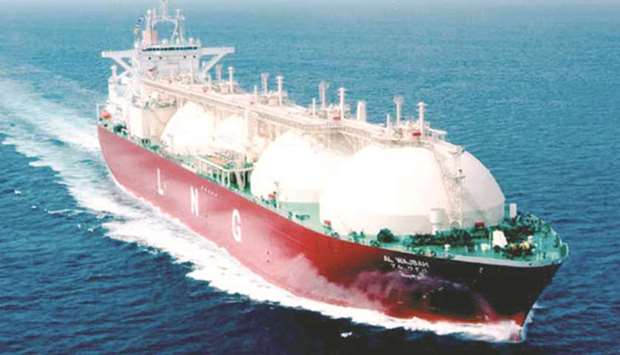Qatar remains well-placed to meet rising LNG demand in the face of competition for regional market share from the US, Russia and Australia due to its low production costs and spare capacity, BMI Research has said in a report.
“With growing demand for natural gas, Asia will continue being a focal point of competition for market share in the LNG space. Amid increasing competition, Qatar will look for new export destinations in the region, targeting less established markets such as Pakistan, Thailand and Bangladesh,” the Fitch Group company said.
“Despite the continuing diplomatic crisis in the region, Qatar's LNG exports remain largely unimpacted by political tensions in the GCC region,” BMI said.
The country’s export destinations are well-diversified with Europe remaining a key trade partner. However, higher prices of liquefied natural gas in Asia, supported by growing demand of natural gas in the region, will continue driving global export dynamics.
As part of efforts to reduce pollution in urban areas, Asia's demand for cleaner-burning natural gas is set to increase in the coming years, it said.
In July 2017, Qatar announced that it plans to raise its LNG production to 100mn tonnes a year within the next five to seven years. Despite widespread forecasts indicating an LNG glut, China’s attempts to combat pollution led to a 4 3% increase in LNG imports in 2017, with Qatar often acting as a “swing supplier”, increasing its exports to the region to meet demand spikes.
LNG exports from Qatar to China increased 49% in 2017, and were more than double the 5mn tonnes per annum contract volumes that are in place, BMI noted.
“Qatar remains well-positioned to continue being the biggest supplier of LNG to global markets supported by low production costs and the presence of necessary infrastructure. Also, Qatar's strategic location, giving the country access to potential export markets, will support Doha's ambitious plans and help expand its presence in Asia,” BMI said.
With increasing demand for natural gas, Asia will continue being a focal point of competition for market share over BMI’s forecast period.
“We do not expect Qatar’s position as a key LNG player in the region to be challenged in the coming years, though Doha will see increasing competition from Australia’s LNG supplies, following the completion of Wheatstone, Prelude and Icthys projects. As a result of g rowing competition, Qatar may also see increasing pressures from the demand side, as LNG buyers may want to renegotiate long-term contracts to reflect the changing price dynamics ,” BMI said.
Even with challenges and increasing competition in the region, Qatar's position in Asia will remain dominant, BMI noted.
“With the planned expansion of LNG capacity in Qatar, the country will increasingly focus on new emerging LNG markets in the region. As a result of growing demand for gas in Pakistan and Bangladesh and rising consumption in more established markets such as India and Thailand, we are expecting to see greater volumes of LNG supplies delivered to these less traditional but faster-growing demand centres in Asia,” BMI added.
“Despite the continuing diplomatic crisis in the region, Qatar's LNG exports remain largely unimpacted by political tensions in the GCC region,” BMI said.
The country’s export destinations are well-diversified with Europe remaining a key trade partner. However, higher prices of liquefied natural gas in Asia, supported by growing demand of natural gas in the region, will continue driving global export dynamics.
As part of efforts to reduce pollution in urban areas, Asia's demand for cleaner-burning natural gas is set to increase in the coming years, it said.
In July 2017, Qatar announced that it plans to raise its LNG production to 100mn tonnes a year within the next five to seven years. Despite widespread forecasts indicating an LNG glut, China’s attempts to combat pollution led to a 4 3% increase in LNG imports in 2017, with Qatar often acting as a “swing supplier”, increasing its exports to the region to meet demand spikes.
LNG exports from Qatar to China increased 49% in 2017, and were more than double the 5mn tonnes per annum contract volumes that are in place, BMI noted.
“Qatar remains well-positioned to continue being the biggest supplier of LNG to global markets supported by low production costs and the presence of necessary infrastructure. Also, Qatar's strategic location, giving the country access to potential export markets, will support Doha's ambitious plans and help expand its presence in Asia,” BMI said.
With increasing demand for natural gas, Asia will continue being a focal point of competition for market share over BMI’s forecast period.
“We do not expect Qatar’s position as a key LNG player in the region to be challenged in the coming years, though Doha will see increasing competition from Australia’s LNG supplies, following the completion of Wheatstone, Prelude and Icthys projects. As a result of g rowing competition, Qatar may also see increasing pressures from the demand side, as LNG buyers may want to renegotiate long-term contracts to reflect the changing price dynamics ,” BMI said.
Even with challenges and increasing competition in the region, Qatar's position in Asia will remain dominant, BMI noted.
“With the planned expansion of LNG capacity in Qatar, the country will increasingly focus on new emerging LNG markets in the region. As a result of growing demand for gas in Pakistan and Bangladesh and rising consumption in more established markets such as India and Thailand, we are expecting to see greater volumes of LNG supplies delivered to these less traditional but faster-growing demand centres in Asia,” BMI added.

